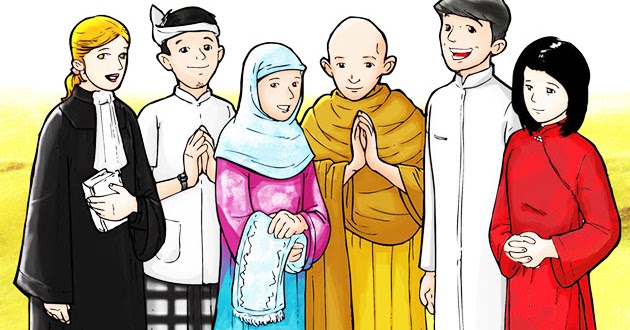 Source: bing.com
Source: bing.comIndonesia is known for its diverse culture and religions. The country is home to various religions such as Islam, Christianity, Hinduism, Buddhism, and Confucianism. This diversity of religions has not only shaped Indonesia’s culture but also contributed to the country’s national identity. Despite the differences, Indonesians have managed to live in harmony with each other regardless of their religious beliefs. This article will explore the reasons why various religious teachings can be accepted by Indonesians.
Religious Tolerance
Indonesians have a long history of religious tolerance. The country’s founding fathers, who were from different religious backgrounds, believed in the importance of religious freedom and tolerance. This belief is enshrined in the country’s constitution, which guarantees freedom of religion for all citizens. This has allowed Indonesians to practice their religion freely without fear of persecution. The government also recognizes and respects the diversity of religions in the country, which has contributed to the acceptance of different religious teachings.
Shared Values
Despite the differences in religious teachings, many religions share common values such as love, compassion, honesty, and respect. Indonesians have embraced these values and incorporated them into their daily lives, regardless of their religious beliefs. This has resulted in a shared sense of morality and ethics, which transcends religious differences. These shared values have helped to create a sense of unity among Indonesians, regardless of their religious background.
Cultural Influences
Indonesia has a rich cultural heritage that has been shaped by various religions. This has resulted in a unique blend of cultural traditions that are both religious and secular. Many of these traditions have become part of the country’s identity and are celebrated by Indonesians, regardless of their religious beliefs. For example, the Islamic holiday of Eid al-Fitr is celebrated by Indonesians of all religions, while Christmas is also widely celebrated, even by non-Christians.
Education
The Indonesian education system plays a crucial role in promoting religious tolerance and acceptance. The curriculum includes subjects that promote diversity and religious understanding. Students are taught about different religions, their beliefs, and practices, and are encouraged to respect all religious traditions. This has resulted in an educated population that is more tolerant and accepting of different religious teachings.
Interfaith Dialogue
Interfaith dialogue is an essential tool in promoting religious acceptance in Indonesia. It provides a platform for people of different religions to come together and share their beliefs and experiences. This dialogue helps to break down stereotypes and promotes understanding and tolerance. The government and various non-governmental organizations have organized interfaith dialogues, which have played a significant role in promoting religious acceptance in the country.
Conclusion
Indonesia’s acceptance of different religious teachings is a result of various factors, including religious tolerance, shared values, cultural influences, education, and interfaith dialogue. These factors have contributed to the country’s national identity, which is characterized by diversity, tolerance, and acceptance. Indonesians have shown that it is possible to live in harmony with each other, despite their religious differences. This is a testament to the country’s commitment to promoting religious freedom and tolerance.
